ITALIAN CONSTRUCTION equipment manufacturer, TowerLight, has established a special division that will focus on wheel-washing technology.
February 6, 2012
Read time: 2 mins

ITALIAN CONSTRUCTION equipment manufacturer, TowerLight, has established a special division that will focus on wheel-washing technology.
Called2271 DF Ecology, this new business is applying environmental science technology to the field of wheel washing, according to the firm.
The new DF Ecology division is concentrating on the design and development of innovative machinery that incorporates a range of environmental features, offering benefits for both the operator and the environment. The latest development from DF Ecology is an advanced, self-contained, automatic wheel washer system designed for permanent, temporary or short-term installation. The new WW220 unit features a dual photo sensor that automatically starts the washing process as the vehicle approaches, removing the need for the driver to leave the cab.
It has a powerful 2.5kg/cm2 water spray pressure, which ensures that both the front and rear wheels of a vehicle are simultaneously cleaned and effectively removing dust and debris. DF Ecology has also fitted the WW220 with a novel conveyor system for safe sludge discharge and an automatic pump screen selfcleaning system. The machine has a 6,000litre water system allowing over 500 washes/day.
An operator can monitor the number of washes used each day using the electronic digital counter. The complete unit weighs 4.5tonnes and measures 5748 x 2200 x 2076mm with power provided from a 380/460V three-phase supply at 50 Hz for European operation. The WW220 has an emergency stop button as standard and a heater is available as an option, enabling the system to be used during cold periods. Installation and removal of the WW220 is said to be simple as it has four lifting lugs and for temporary installation or short-tem use, the firm offers the WW220 Ramp. This sister product weighs just 3.5tonnes, is more compact and will handle over 200 vehicles/day. The WW220 Ramp is fitted with a pump screen self-cleaning system, entry and exit ramps and starts-up automatically through the photo sensor process. The WW2200 Ramp is ideally suited as a rental product on both long and short-term rental periods.
Called
The new DF Ecology division is concentrating on the design and development of innovative machinery that incorporates a range of environmental features, offering benefits for both the operator and the environment. The latest development from DF Ecology is an advanced, self-contained, automatic wheel washer system designed for permanent, temporary or short-term installation. The new WW220 unit features a dual photo sensor that automatically starts the washing process as the vehicle approaches, removing the need for the driver to leave the cab.
It has a powerful 2.5kg/cm2 water spray pressure, which ensures that both the front and rear wheels of a vehicle are simultaneously cleaned and effectively removing dust and debris. DF Ecology has also fitted the WW220 with a novel conveyor system for safe sludge discharge and an automatic pump screen selfcleaning system. The machine has a 6,000litre water system allowing over 500 washes/day.
An operator can monitor the number of washes used each day using the electronic digital counter. The complete unit weighs 4.5tonnes and measures 5748 x 2200 x 2076mm with power provided from a 380/460V three-phase supply at 50 Hz for European operation. The WW220 has an emergency stop button as standard and a heater is available as an option, enabling the system to be used during cold periods. Installation and removal of the WW220 is said to be simple as it has four lifting lugs and for temporary installation or short-tem use, the firm offers the WW220 Ramp. This sister product weighs just 3.5tonnes, is more compact and will handle over 200 vehicles/day. The WW220 Ramp is fitted with a pump screen self-cleaning system, entry and exit ramps and starts-up automatically through the photo sensor process. The WW2200 Ramp is ideally suited as a rental product on both long and short-term rental periods.









